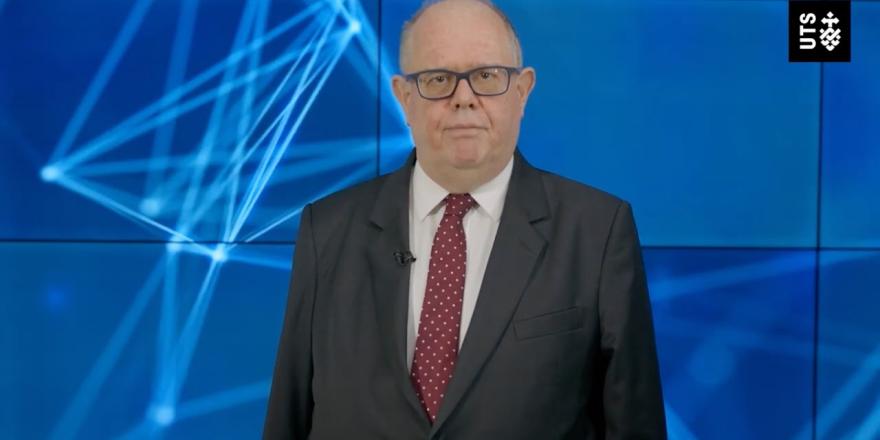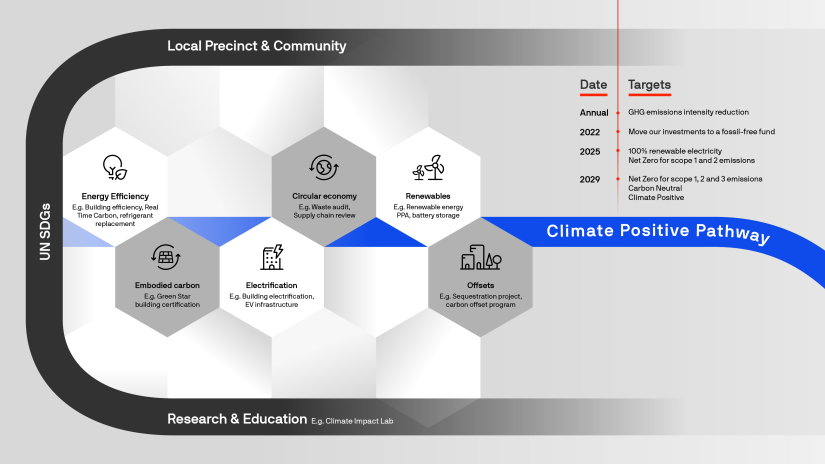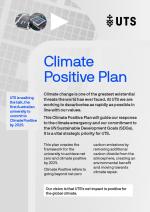Climate change is one of the greatest existential threats the world has faced. At UTS we are working to decarbonise as rapidly as possible in line with our values.

The UTS commitment
The UTS Climate Positive Plan guides our response to the climate emergency and our commitment to the UN Sustainable Development Goals (SDGs). It is a vital strategic priority. Our vision is that UTS’s net impact is positive for the global climate.

Andrew Parfitt, Vice-Chancellor and President
At UTS we are taking action on climate change. In 2019 we were the first Australian university to sign the climate emergency declaration. In 2021 we achieved our 30 per cent greenhouse gas reduction target from the 2007 baseline. UTS is committed to the United Nations Sustainable Development Goals, and a signatory to Race to Zero, a global initiative providing leadership on the path to net zero and climate repair. We shifted the university’s investments to a fossil-free fund in 2022, and launched the UTS Climate Positive Plan, charting the path for our own decarbonisation journey to Climate Positive by 2029.
Universities have a vital role to play in how society responds and adapts to climate change and I am especially proud of the contribution being made by our researchers. From developing world-leading energy solutions with new battery technology, to smart inverters for renewable energy grids. From our marine scientists working to improve coral resilience on the Great Barrier Reef, to our focus on social justice, helping ensure that equity and fairness are at the centre of climate change adaptation.
Our students too, make a significant contribution. Their generation will be more impacted by climate change and their passion, energy and ideas help propel efforts across the university. I encourage you to take a look at the UTS4Climate website showcasing the activities of UTS staff and students.
The UTS pathway to net zero and beyond will help achieve the necessary and just transition to a low carbon renewable economy. The tertiary education sector has a vital role to play as an actor of change, developing innovative solutions, showcasing leadership, and equipping our graduates with the tools to contribute to positive change. Investment now in action-oriented research and skills development are an investment in the future.
In this video Vice Chancellor, Andrew Parfitt talks about UTS's climate positive goals.
This plan creates the framework for the university to achieve net zero and be climate positive by 2029.
Climate Positive refers to going beyond net zero carbon emissions by removing additional carbon dioxide from the atmosphere, creating an environmental benefit and moving towards climate repair.
UTS is walking the talk, the first Australian university to commit to Climate Positive by 2029.
How we’ll do it
This diagram shows the key initiatives and commitments.

Climate Positive Plan diagram – text only version
Six core themes define the UTS Climate Positive pathway – energy efficiency, embodied carbon, electrification, circular economy, renewables and offsets.
All six themes link to the broader context of our research and education, our community and local precinct, and the UN Sustainable Development Goals.
The Pathway timeline of targetsAnnual – greenhouse emission intensity reduction 2022 – move our investments to a fossil free fund 2025 – 100% renewable electricity, and net zero for scope 1 and 2 emissions 2029 – net zero for scope 1, 2 and 3 emissions. Carbon Neutral, and Climate Positive.
Informed by the RACE for 2030’s Green Wave research project, the pathway towards Climate Positive consists of six key themes, with targeted initiatives that will enable us to decarbonise as rapidly and cost-effectively as possible. These themes are:
- energy efficiency
- electrification
- renewable energy
- embodied carbon
- circular economy
- offsets
Our target is for all electricity to be supplied by renewable energy technology by 2025 and achieve climate positive by 2029. UTS’s climate action extends beyond operational emissions, harnessing and strengthening our research and education, extending our boundaries of influence to our local precinct and community, and reframing net zero through a social impact lens to integrate our delivery of the UN SDGs.
Benefits
The UTS Climate Positive Plan will deliver the following benefits:
- urgently address climate change
- demonstrate leadership
- meet our Climate Emergency Declaration and UN SDGs commitments
- achieve financial savings by capitalising on already adopted smart technology whilst continuing to invest in innovative energy cost-saving solutions
- leverage innovative initiatives for research, and teaching and learning
- future-proof campus infrastructure
- leverage our experience for others to encourage a green economic recovery
- help fulfil community, industry, and government expectations.
UTS is a founding member of the City of Sydney's Better Buildings Partnership and an active member of the Climate Positive Working Group.
The climate wars are over. It’s now time to develop practical, innovative solutions and UTS is leading the way.
Ways you can help UTS achieve Climate Positive
STUDENTS
- Join a student group like the EnviroCollective or EcoSoc and participate in campaigns, protests, and fundraisers
- Sign up to UTS SOUL, learn new skills and give back to the community
- Participate in Green Week and Global Goals Month activities
- Take sustainability-focused subjects
- BYO cups and food containers
- Travel to campus sustainably using public transport or active transport, like walking or cycling.
ACADEMICS
- Incorporate the UN Sustainable Development Goals into your teaching
- Undertake and promote research that has a positive impact on sustainable development and climate change
- Consider the GHG emission impacts of your research work
- Participate in campus events like Global Climate Change Week (Oct) and Global Goals Month (Sept)
- Ensure lights and AV equipment are turned off before exiting teaching and research spaces
- Shift your superannuation to fossil-free. Most funds, including UniSuper, offer fossil fuel free options. See example here
- Attend international and interstate conferences virtually where possible.
PROFESSIONAL STAFF
- Form a group with your colleagues and participate in Green Impact
- Embed sustainability into your policies and procedures. Ask us how
- Procure goods and services sustainably. Here’s how
- Pick up sustainability tips by listening to 2SER’s Think: Sustainability podcast
- Shift your superannuation to fossil-free. Most funds, including UniSuper, offer fossil fuel free options. See example here
- Take social justice leave and volunteer your time, skills and expertise to the community.
More information FOR UTS STAFF
Access the full plan on Staff Connect


